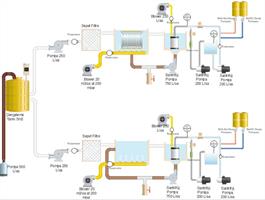Within the scope of the project, it is planned to increase the efficiency of the membrane system by combining the MBR system and the IFAS system into a single system. In this direction, by using the film fixation feature offered by IFAS, filtration with low AKM in the membrane tank will increase the fluxes.
Within the scope of the project, it is planned to increase the efficiency of the membrane system by combining the MBR system and the IFAS system into a single system. In this direction, by using the film fixation feature offered by IFAS, filtration with low AKM in the membrane tank will increase the fluxes.
You can find the detailed explanation about the project, coordinated by Prof. Dr. Alper İlki, below.

Project Title: Investigation of Innovative Hybrid Membrane Bioreactor (If-Mbr) Treatment Technology for Pollution Load Reduction in Wastewaters
Project Type: İstanbul Teknik Üniversitesi
Project Coordinator: Assist. Prof. Dr. Türker Türken
Abstract:
In recent years, due to the increase in the amount of water to be treated, research on new treatment processes that less space and are very efficient in terms of economics and effluent quality has intensified. Membrane technologies are at the forefront of these technologies. Membrane Bioreactor (MBR) systems, which can be used instead of conventional treatment systems in domestic wastewater treatment plants, have created a widespread field of study because they are both economical and easy to operate.
Membrane bioreactor systems (MBR) are combined treatment systems that are widely used in the treatment of domestic and industrial wastewater, biological decomposition with an activated sludge system, and solid-liquid separation with membrane filtration. The MBR process is mainly based on the physical separation of treated water and activated sludge with a membrane. Due to the high separation efficiencies, it provides, it is a process that consists of incorporating a membrane module that provides physical separation into the process, either submerged or externally, instead of the secondary settling tank in conventional domestic wastewater treatment plants.
According to research that conducted by Ministry of Environment and Forest, the wastewater discharge originating from the Marmara Basin is around 5 million m3. With rapid population
growth and industrialization, it is predicted that this waste discharge will increase further in the coming years. Due to location problems in Istanbul, waste is discharged into the Marmara Sea only after pre-treatment. In addition, industries such as textiles, where waste production is high, constitute a point source of pollution in the Marmara Sea.
The IFAS treatment process combines traditional activated sludge and biofilm technologies in a single reactor. It offers a performance increase of approximately 40% without the need to add new aeration tanks to existing systems. IFAS adds high surface area to the activated sludge pool. This media/surface area provides additional biomass and increases the growth rate of microorganisms. This increases the sludge age and ensures high performance of the treatment efficiency (AQWISE, 2010).
Within the scope of the project, it is planned to increase the efficiency of the membrane system by combining the MBR system and the IFAS system into a single system. In this direction, by using the film fixation feature offered by IFAS, filtration with low AKM in the membrane tank will increase the fluxes. In addition, due to the high adhesion of microorganisms, much more wastewater can be treated hydraulically with high efficiency in less areas. In this situation, many advantages will be provided in the revision of classical wastewater treatment plants to advanced biological wastewater treatment plants, especially in places with space problems, to treat much more wastewater in the same volume as capacity increases.
As explained in the declaration submitted by the Ministry of Environment and Forestry within the scope of Combating Mucilage, the project can also reveal scientific results for the design and research of the vision of using membrane systems to provide wastewater recovery in the modernization of wastewater treatment plants.